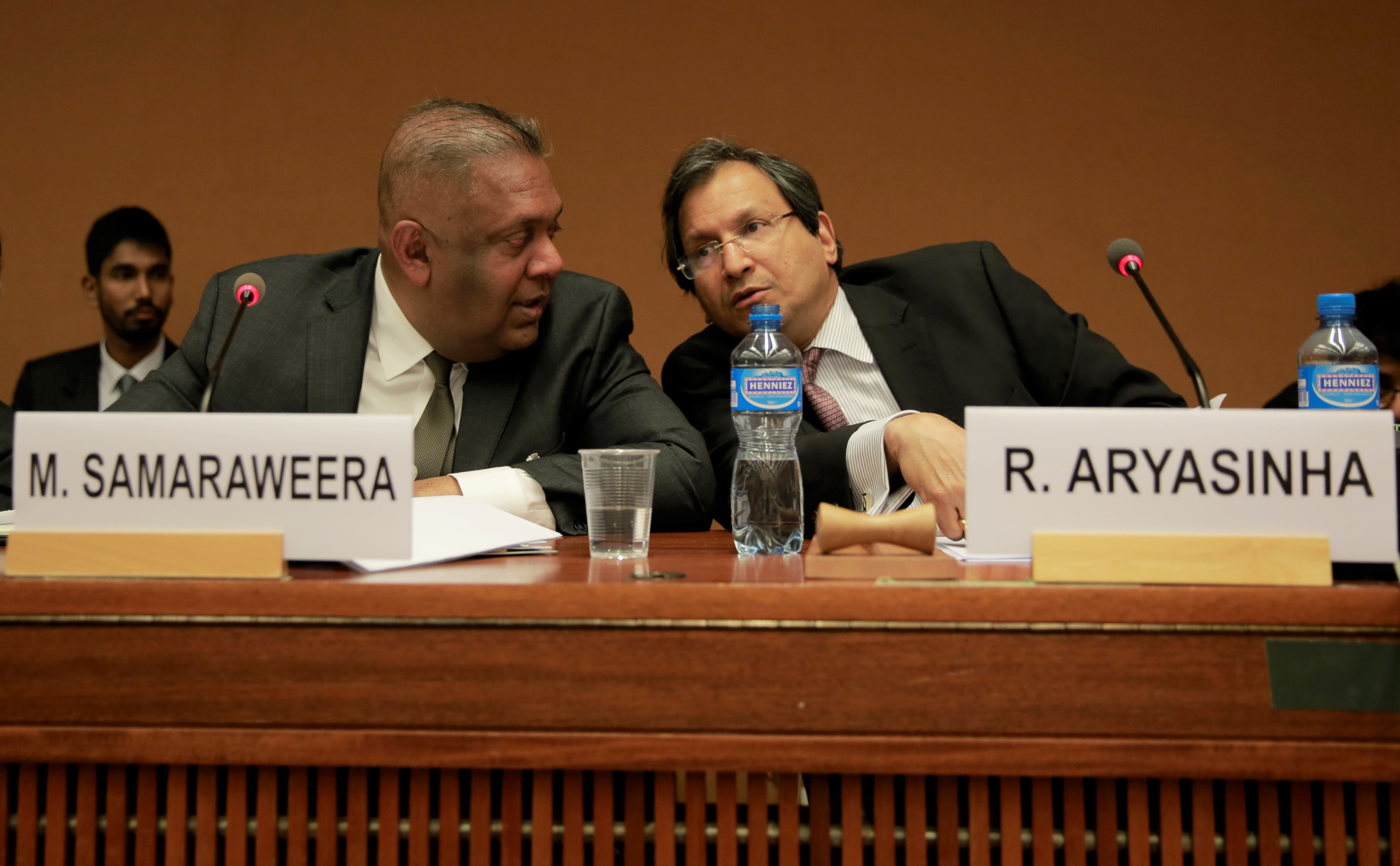Image: Sri Lanka FM Samaraweera and Ambassador to UNHRC Ariyasinghe at GoSL side event held on 01 March at UNHRC. ©s.deshapriya.
Sri Lanka’s Ministry of External Affairs (MEA) says that the Sri Lanka Resolution to be adopted at the UNHRC will not include taking on any new commitments arising from the High Commissioner’s Report to the Council at its current 34th Session.
Issuing a statement to clarify certain media reports MEA further says that “what Sri Lanka will undertake at the current 34th session, is a two-year extension of the timeline for fulfilment of commitments made in Resolution 30/1, and that there will be no additional or new commitments arising from the High Commissioner’s Report to this current 34th Session.”
The statement quotes the Sri Lanka Ambassador to the UNHRC thus: “We are studying all their reports carefully and we will, at a suitable time, share our views and observations on the issues raised in the High Commissioner’s latest Report, after consultation with all parties concerned, and also provide updates.”
Full text of the statement follows:
Clarification by the Ministry of Foreign Affairs: misleading report in The Island newspaper of 8 March 2017
The Ministry’s attention has been drawn to a misleading report carried in The Island newspaper of 8 March 2017, titled ‘UN resolutions not binding on Sovereign Nations – Govt., ..but commitments will be honoured in keeping with Sri Lankan laws’, misquoting the Deputy Minister of Foreign Affairs, Harsha de Silva.
The Ministry wishes to state the following, clarifying misperceptions that have arisen as a result of this erroneous news report:
-During the Government headed by former President Mahinda Rajapaksa, the Human Rights Council, on 27 March 2014, adopted Resolution 25/1 titled ‘Promoting reconciliation, accountability and human rights in Sri Lanka’, requesting the High Commissioner, inter alia, to undertake a comprehensive investigation into alleged serious violations and abuses of human rights and related crimes by both parties in Sri Lanka during the period covered by the LLRC, and to establish the facts and circumstances of such alleged violations and of the crimes perpetrated with a view to avoiding impunity and ensuring accountability, with assistance from relevant experts and special procedures mandate holders.
-Following this request of the Council, the High Commissioner launched the OHCHR Investigation on Sri Lanka (OISL), a first of this nature carried out by an external entity on matters pertaining to Sri Lanka. Moreover, further international action was being envisaged on Sri Lanka as a result of the Government’s inaction on matters pertaining to rule of law, reconciliation, and governance, at the time the Presidential Election was held on 8 January 2015.
-Following the Presidential election on 8 January 2015, the National Unity Government of Sri Lanka, under the leadership of President Mathripala Sirisena and Prime Minister Ranil Wickremesinghe, took steps to take ownership of reconciliation, rule of law, accountability, human rights and governance issues.
-As a result, when the OISL Report and the High Commissioner’s Report were presented at the 30th Session of the Council in September 2014, the Human Rights Council, having paid heed to the responsible manner in which the Unity Government had embarked on handling matters pertaining to reconciliation, accountability, human rights, rule of law and governance, adopted Resolution 30/1 on 1 October 2015, co-sponsored by Sri Lanka as well, clearly placing the Government of Sri Lanka in-charge of handling matters pertaining to these areas, and thus shifting all action to the domestic realm. As called for by the Resolution, the High Commissioner will be presenting a comprehensive report on the implementation of the Resolution to the Council on 22 March 2017. This Report has been made available in advance to the public.
-The Resolution that Sri Lanka’s Permanent Representative to the UN in Geneva, Ravinatha Aryasinha committed to co-sponsor at the current 34th Session of the Council, making a statement to this effect at the informal consultation held in Geneva on 7 March 2017, is one that provides for a two-year extension of the timeline for fulfilment of commitments made in Resolution 30/1. While “the views, observations and recommendations of the High Commissioner for Human Rights and the Special Procedures”, as stated by Ambassador Aryasinha, “are constructive and meaningful for Sri Lanka as we strive to strengthen, promote, and protect human rights, good governance, and the rule of law in Sri Lanka”, the Resolution will not include taking on any new commitments arising from the High Commissioner’s Report to the Council at its current 34th Session. As stated by Ambassador Aryasinha, “We are studying all their reports carefully and we will, at a suitable time, share our views and observations on the issues raised in the High Commissioner’s latest Report, after consultation with all parties concerned, and also provide updates.”
– What the Deputy Minister of Foreign Affairs set out to explain and clarify is that what Sri Lanka will undertake at the current 34th session, is a two-year extension of the timeline for fulfilment of commitments made in Resolution 30/1, and that there will be no additional or new commitments arising from the High Commissioner’s Report to this current 34th Session.
